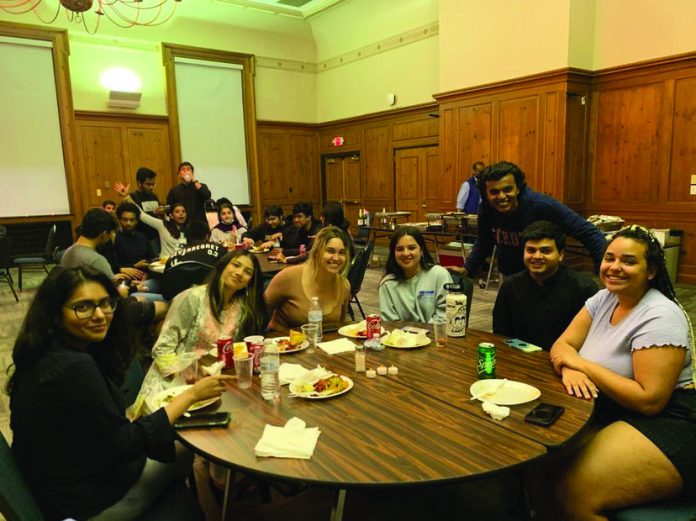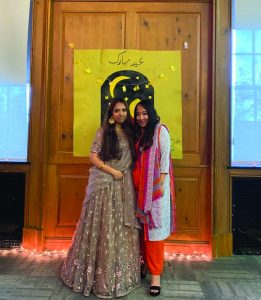
On Tuesday, May 3, the Muslim Student Association (MSA) hosted a formal dinner in the UB ballroom to celebrate Eid, a Muslim celebration that marks the end of Ramadan.
The MSA provided free food for those who attended. The event was open to Muslims as well as non-Muslims.
According to Aneesa Ahmed, a sophomore from Nepal and MSA vice president, Eid is about being grateful for what you have and for those around you and fostering a sense of community, adding that celebrating Eid on campus was a lot different compared to her home country.
“We used to go to my grandmother’s house for Eid and spend the whole day there eating good food, spending time with my extended family, and enjoying ourselves,” Ahmed said.
“Although I have had a great experience on campus celebrating Eid, it is definitely not the same as celebrating it back home.”
Mahnoor Zahid, a sophomore from Pakistan and MSA Public Relations officer, said that celebrating Eid while being away from her family was challenging.
“Eid and Ramadan are all about family and community, and being an international student and becoming a minority, you lose that,” Zahid said. “But over the years the Muslim community over here at DePauw has grown and we have learned to call each other our family so it's a different form of the celebration because we have a different idea of community now.”
Zahid pointed out that since Eid is a religious holiday, it is mostly celebrated in a similar way in different Muslim countries. However, there are some unique differences. For instance, Zahid said that in her home country, Muslims cook sweets early in the morning on Eid and their first meal of the day has to be a sweet dish. Hence, Eid in Pakistan is sometimes called "Meethi Eid" or "Sweet Eid.”
“The concept of calling [Eid] a sweet Eid is very South Asian or Pakistani. People usually wear their cultural clothes as a form of celebration, which will differ from country to country. South Asian countries also have this concept of giving "Eidi," which is basically some form of money or sweets given from elders to little children,” Zahid said.
According to senior Abdullah Salau, in his home country, Nigeria, he and his family usually host guests for traditional food and prayers. Afterwards, they give food to different members of their community and walk to the mosque.
“[In Nigeria] you can always find a mosque within walking distance wherever you are, but here in Greencastle, the Muslims on campus have to drive 30-45 minutes away to get to the mosque,” Salau said. “Also, Eid days are public holidays back home, but here you’re going to be worrying about missing classes on campus.”
He pointed out how supportive the Center for Spiritual Life (CSL) is when it comes to helping students of different religious beliefs host events and making sure they have enough funds to do so.
“The CSL has been a haven for Muslims on campus for a while now and it is no surprise we, Muslims, usually gather there to pray and sometimes break our fasts together,” Salau said.
Sophomore Zaheen Rashed from Indianapolis, IN, said she was blessed to be able to go back home the weekend leading up to Eid and spend the first day of the holiday with her friends and family. She spent the second day with her Muslim friends at DePauw.
“It felt surreal to celebrate with new people in addition to those who I had been celebrating with since birth, especially since the people at DePauw come from an array of different cultures and nationalities,” Rashed said. “It was interesting to see how, despite these ethnic and cultural differences, we can be united by our faith.”



